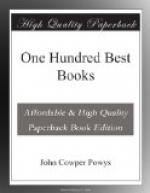91. CHARLES L. DODGSON. ALICE IN WONDERLAND. The edition with the original illustrations.
It would be ridiculous to compile a list of a hundred best books and leave out this one. Lack of space alone prevents us from including “Through the Looking Glass” too.
“Alice” is after all as much of a classic now and by the same right, the right of a universal appeal, to every type of child, as Mother Goose of the Nursery Rhymes. She had only to appear—this slender-legged, straight-haired, Early-Victorian little prude, to enter at once the inmost arcana of the temple of art. The book is a singular evidence of what the power of a desperate devotion can do—a devotion like this of Mr. Dodgson to all little girls—when a certain whimsical genius belongs to the possessed by it.
The creator of Alice has really done nothing but permit his absorbing worship of many demure little maids to focus and concentrate itself into an almost incredible transformation of what was the intrinsic nature of the writer into what was the intrinsic nature of the “written-about.”
The author of this book has indeed, so to speak, eluded the limitations of his own skin, and by the magic of his love for little girls has passed—carrying his grown-up cleverness with him—actually into the little girl’s inmost consciousness. The book might be quite as witty as it is and quite as amusing but it would not carry for us that peculiar “perfume in the mention,” that provocative enchantment, if it were not much more—Oh, so much more—than merely amusing. The thousand and one reactions, impressions, intimations, of a little girl’s consciousness, are reproduced here with a faithfulness that is absolutely startling. What really makes the transformation complete is the absence in “Alice” of that half-comic sententious priggishness which, as soon as we have ceased to be children, we find so curiously irritating in Kingsley’s “Water Babies.”
92. JOHN GALSWORTHY. THE COUNTRY HOUSE. THE MAN OF PROPERTY. FRATERNITY.
John Galsworthy is almost alone among modern writers in the possession of a genius, which in the most exact sense of that admirable word, can only be described as the genius of a gentleman. It is a style singularly sensitive, a little vibrant perhaps sometimes, and so tense as to become attenuated, but of a most rare and wistful beauty. His humor which is his weakest point is a thing of almost feminine perceptions but quaintly pliable, as the sense of humor in women often is, to an odd strain of peevish extravagance.
The chivalrous nobility of Mr. Galsworthy’s habitual mood is at once the cause of certain fragilities and betrayals in the mass and weight of his art and the cause of the indignant pity which evokes some of his finest touches.
It seems to irritate his nerves almost to frenzy to contemplate the shackles and fetters with which, whether in the domestic or social or legal world, the free spirits of men and women are bound down and imprisoned.




